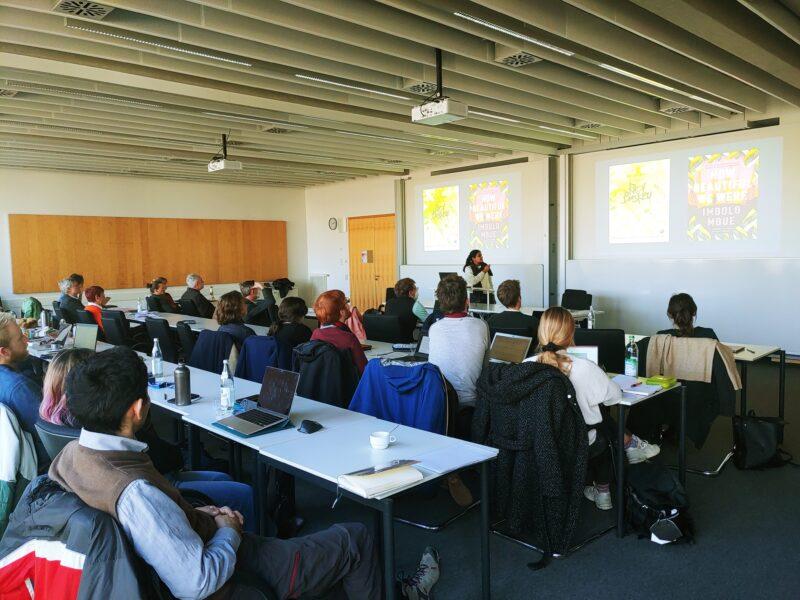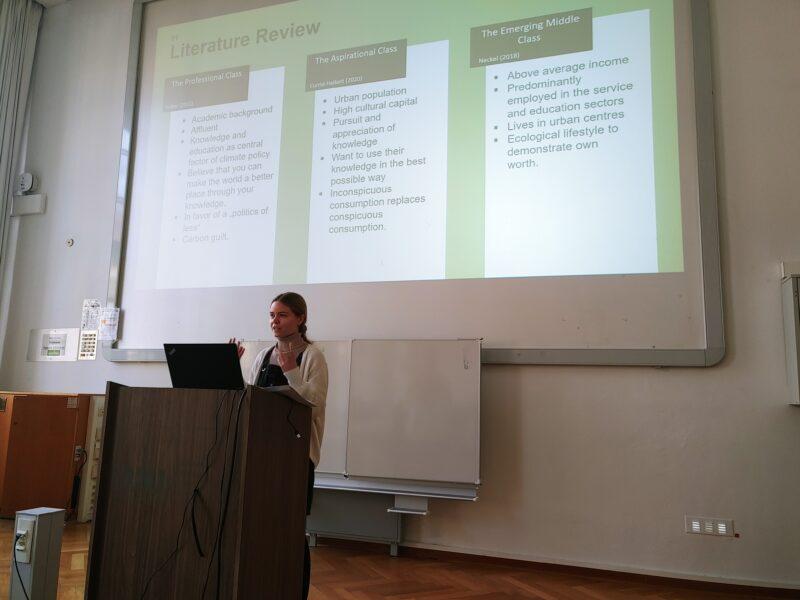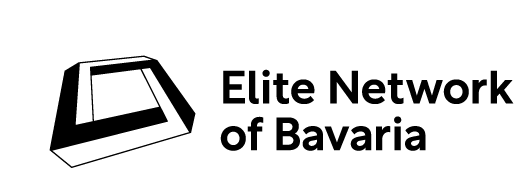
PhD student Lakshmi Dilipkumar presenting at the IDK Colloquium 2023
Kirsten Twelbeck
COLLOQUIUM

PhD student Katharina Karrenbauer presenting at the IDK Colloquium 2023
Kirsten Twelbeck
The second colloquium of the IDK Um(welt)Denken took place between February 15 and February 17, 2023, at the University of Augsburg and LMU Munich. During the event, doctoral students presented their research progress to the team of peers and advisors.
The second colloquium of the international doctoral program UmWeltDenken, was an opportunity for all the PhD students to discuss their research projects with peers and advisors. Taking place at the University of Augsburg and Ludwig-Maximilians-University in Munich, during three days in February, the event offered a platform for participants to share their research and engage in in-depth discussions and interdisciplinary exchange.
The event kicked off in the Center for Climate Resilience at the University of Augsburg. Laura Fumagalli from Italy was the first to present her research; she focused on negative landscape aesthetics and the value system behind this. Maximilian Pieper followed right after, with a project tackling philosophical questions concerning technology and power, the theatrical character of productivity, and the concept of energy.
After lunch, the group rejoined to listen to Christian Schnurr elaborating on silence and invisibility in pollution discourse, and to Lakshmi Dilipkumar, who shared her progress on Anglophone extraction novels from the Global South. This was followed by another literature panel about Lucia Medici’s and Anne-Sophie Balzer’s ecocriticism projects, featuring cultural ecology in the novels of Richard Powers and poems on glaciers (so called Cryopoesis).
The next day of the colloquium took place in the main building of LMU. The first set of presentations started with PhD student Fizza Batool, who focused on environmental justice and talked about her research progress on political ecology in Pakistan. Katharina Karrenbauer redirected the audience’s attention to Bavaria. Her quantitative research focuses on social inequality and individualisation in sustainability efforts. The second panel combined questions from anthropology, geography, and sustainability. Lukas Emrich reported on his latest findings concerning alternative housing practices and Christopher Klapperich shared his latest insights about tree planting initiatives in the Philippine Forests.
After a lunch break, Livia Cahn discussed what we can learn from drilling chores while Floris Winckel dug into representations of snowflakes. This was followed by Katie Kung‘s presentation on invasive species and necropolitics, with a focus on Kudzu. PhD student Jasmijn Visser, who is also an artist, closed the day with a media-supported performance lecture about climate change.
The final day of presentations once more took place in Augsburg. Elisabeth Schuster‘s presentation dealt with concepts of mobility in the primary classroom and Pia Wimmer talked about environmental ethics and consumerism as topics in the “living lab” that she had conducted in the middle school classroom. After a short coffee break, the students and advisory team resumed to listen to Felix Treutner elaborating on eschatology, philosophy, and ethics. The historian Sven Seelinger concluded the colloquium with a presentation about barbed wire and borders.
Like the first colloquium, the event turned out to be a great opportunity for PhD students to practice and demonstrate their research and science communication skills. In their feedback, the participants highlighted the friendly and supportive environment that made the colloquium an enriching and formative intellectual and personal experience.
